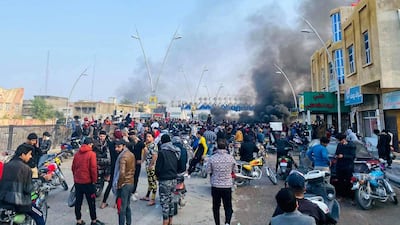A protester was killed and dozens wounded on Tuesday in Iraq as anti-government protests erupted in the southern province of Kut, security authorities said.
Hundreds of demonstrators took to the streets early this week in the city of Wasit, the provincial capital of Kut, to demand the resignation of the local government, better public services and an end to unemployment.
Last month, demonstrators gave Mohammed Jameel Al Mayahi, the province's governor, and his government, 10 days to resign. He has yet to quit.
Skirmishes erupted late last month between demonstrators and local security forces when they tried to end the protests in the city's main square and reopen the local government building.
"We have been protesting since 2019 and we have seen nothing," activist Mohammed Aflok told The National over the phone from Wasit.
"The same corrupt officials with their parties and militias are still controlling the city and its resources. No jobs, no services and the big deals are distrusted only among them," he added.
Last week heavy rains flooded the city, adding to the anger of the residents, Mr Aflok added.
Around 35 protestors were wounded and 80 others arrested, he said. Security forces have been conducting door-to-door chasing activists and protases who have fled their homes, he said.
"We will continue protesting until our demands are met," he said.
Videos on social media showed protesters, some covering their faces with surgical masks or keffiyeh, blocking main intersections and streets with burning tires.
Anti-riot police could be seen chasing stone-throwing protesters. In one incident caught on camera, at least two officers beat a protester with batons as he lay on the pavement.
In another, the body of Fuad Al Majidi was shown in the city's morgue, covered with a white sheet and surrounded by mourning friends and family.
In a statement late on Tuesday, Iraqi security authorities said they had launched an investigation, but blamed the protesters for the violence.
Al Majidi was killed and several others wounded by gunfire, according to the statement, which also accused protesters of using firearms, Molotov cocktails and knives.
Several suspects were arrested, including one with a weapon who was on the roof of a nearby building. About 150 members of the security forces were wounded, including three who were stabbed with knives, authorities said.
In response to the violence, Iraqi Prime Minister Mustafa Al Kadhimi sent the head of the National Security Service to Wasit.
Widespread protests rocked Shiite-dominated cities in central and southern Iraq in October 2019 to demand the removal of the political elite and the introduction of reforms to end endemic corruption, provide a better quality of life and increase employment opportunities.
The protests turned violent after security forces opened fire with live rounds against demonstrators. Activists faced assassinations, kidnappings, harassment and arrests. Iran-backed Shiite militias are accused of being behind the attacks on protesters and activists.
The government and militias denied any role in the killings and instead blamed a "third party".
As of July last year, the government registered the killings of 560 protesters and members of the security forces, while thousands of protesters were hurt, with some suffering life-changing injuries. Dozens of protesters and activists have been killed since then.
When he took office in May, Mr Al Kadhimi pledged to investigate the killings. But his government has yet to hold anyone accountable, offering only promises of justice and financial aid to victims.
A few weeks into the protests, the previous government resigned and parliament endorsed a new electoral law that allows independent candidates to win seats in parliament. The interim government plans an early election in October.
Although protests have largely died down in Baghdad and other cities, sporadic demonstrations continue to occur in Iraq's impoverished south.


